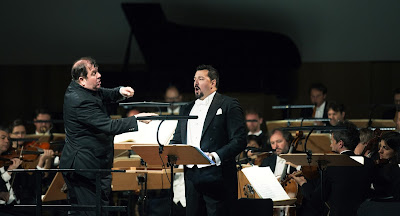 |
| Beethoven: Leonore - Dresden Music Festival - Ivor Bolton, Michael Kupfer-Radecky, Ann Kern, Dresden Festival Orchestra (photo Oliver Killig) |
Reviewed by Robert Hugill on June 18 2017
Star rating:
The original version of Beethoven's opera in a thrilling performance which combined period instruments with modern interventions
 |
| Miriam Clark (photo Oliver Killig) |
Beethoven's opera was given without dialogue, but with a series of interventions from the artists of Bohème 2020, these ranged from dance episodes to video projections, with a substantial dance episode between Acts Two and Three performed to the first movement of Beethoven's Piano Sonata Op.26.
Beethoven's 1805 version of the opera can come as a bit of a shock if you only know Fidelio. Leonore is longer, with more background to the Marzelline, Jacquino, Rocco, Leonore relationships. Closer to Singspiel than Fidelio, it requires two leads who have the right combination of spinto power, flexibility and stamina. I have to confess that having seen the opera staged at Buxton last year (see my review) I rather missed the dialogue, but the acute performances form the singers meant that we lost nothing of the emotional trajectory of the characters.
 |
| Romain Rios (photo Oliver Killig) |
Miriam Clark made a radiant Leonore, singing with bright flexible tone and displaying a real jugend-dramatisch voice. She had a vivid way of conveying Leonore's emotions both visually and musically; this was a very complete performance. It was the combination of her sheer engagement, with a cleanness of articulation in the more ornamental passages which really impressed. In 'Komm Hoffnung' she was complemented by some wonderfully pungent wind solos.
Eric Cutler made an admirable Florestan, youthful and heroic. This version of the role requires less heroic heft and more flexibility, which Cutler provided. His opening solo, following by a thrilling orchestra prelude, combined Cutler's noble, yet plangent tone with orchestral colour which made something both gripping and moving. This scene is far more conventionally operatic than in Fidelio, with Cutler, Clark and Peter Rose (Rocco) giving us a vivid sense of the dramatic narrative. In 'Namenlose Freude' (longer and more complex than in Fidelio), Cutler and Clark complemented each other admirably two lither voices moving together conveying a real sense of joy.
 |
| Ivor Bolton, Eric Cutler, Dresden Festival Orchestra (photo Oliver Killig) |
Michael Kupfer-Radecky gave us a strong projected Don Pizzaro, taking advantage of the extra material particularly his vivid opening aria and the rousing aria with chorus which closes Act Two. Unfortunately his voice sometimes lacked the sheer heft to dominate the orchestra. Tareq Nazmi impressed with a very musical account of Don Fernando's relatively small contribution.
 |
| Christina Gansch, Ivor Bolton, Maja Blomstrand, Dresden Festival Orchestra (photo Oliver Killig) |
The Balthasar Neuman Choir made some notable contributions, singing with focused tone, intensity and great beauty of sound. The prisoner's chorus, with fine solos from Virgil Hartinger and Roland Faust, was beautifully controlled.
The orchestra was essentially an extra character in the drama. Ivor Bolton brought out all the wonderful details of colour and texture which the period instruments allowed to be reveal. This was a finely characterful account of the score, which emphasised Beethoven's links to his predecessors in the genre like Mozart and Cherubini.
 |
| Beethoven: Leonore - Dresden Music Festival - Ivor Bolton, Romain Rios, Maja Blomstrand, Michael Kupfer-Radecky, Dresden Festival Orchestra (photo Oliver Killig) |
Beethoven Leonore
Dresden Music Festival at Dresden Kulturpalast
Leonore - Miriam Clark
Florestan - Eric Cutler
Jacquino - Michael Kupfer-Radecky
Marzelline - Christina Gansch
Don Pizzaro - Martin Mitterutzner
Rocco - Peter Rose
Don Fernando - Tareq Nazmi
Prisoners - Virgil Hartinger, Roland Faust
Bohème 2020:
Joscha Baltes (sound designer/musician)
Maja Blomstrand (dancer)
Danae Dörken (pianist)
Anne Kern (designer/painter)
Romain Rios (dancer/choreographer)
Robin Thomson.(video artist/musician)
Balthasar Neuman Choir (chorus director Detlef Bratschke)
The Dresden Festival Orchestra
Ivor Bolton (conductor)
Elsewhere on this blog:
- Martin Luther in words & music: Flautando Köln & Stefan Bauer at Dresden Music Festival - concert review
- Gorgeous textures: Szymanowski's Stabat Mater from Warsaw - CD review
- Slow burn: Saint-Saens rarely performed opera Prosperpine revived by Palazzetto Bru Zane - CD review
- The guy who serves the music: I chat to film maker turned opera director Aik Karapetian - interview
- Listening with new ears: Haydn's The Seasons from Paul McCreesh, Gabrieli & Wroclaw - CD review
- Style and engagement: Annabel Arden's production of Carmen at The Grange - Opera review
- Re-invention too far? Tchaikovsky's Eugene Onegin in Riga - Opera review
- Striking re-invention: Murnau-inspired production of Gounod's Faust in Riga - Opera review
- The singer and the song: My encounter with baritone Benjamin Appl - interview
- An eloquent evening's entertainment: Les Talens Lyriques in Monteverdi - concert review
- Home



.jpg)






No comments:
Post a Comment